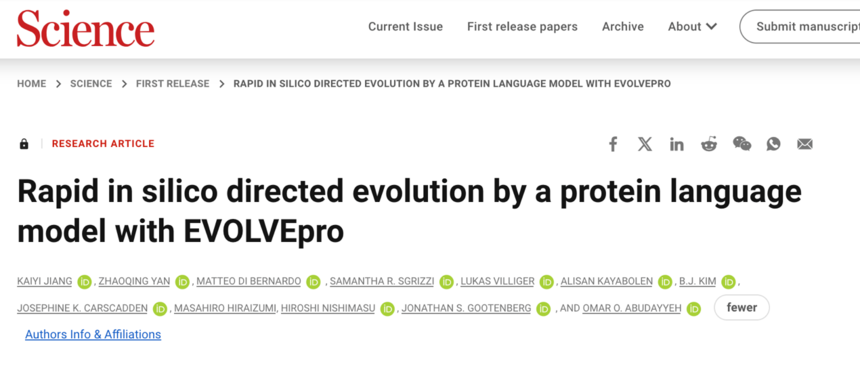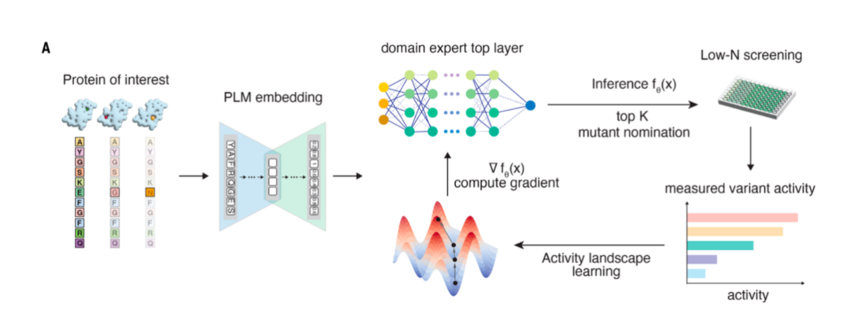Please click the button below to go to our email login page
|
After 7 Years of Dedication, 25-Year-Old PhD Student Publishes another Paper as the First Author in Science!Recently, 25-year-old Kaiyi Jiang published his second paper in Science as the first author. Their research team has developed a highly efficient protein evolution method called EVOLVEpro. This interdisciplinary study closely integrates artificial intelligence with bioengineering, significantly enhancing the efficiency of biological experiments and promoting the application of AI models in the biological field.
Breaking Out of Traditional Thinking Framework
In recent years, AlphaFold has made significant strides in addressing the protein folding problem. However, each human cell expresses over 40 million proteins, which often work in concert. “How these proteins synergistically determine biological phenomenon? What happens to the fold when they touch? These problems cannot be addressed using current AI algorithm”, said Kaiyi Jiang.
Therefore, in this latest published research, the team of Kaiyi Jiang developed AI algorithm-driven protein evolution framework, and verified the performance and effectiveness of EVOLVEpro in RNA production, genome editing and antibody binding.
Greater Ambitious Level: Benchmarking Industry Leading
Initially, Kaiyi Jiang’s goal was straightforward: to evolve a version of RNA polymerase that outperformed those found in nature using algorithms. However, his mentor raised the experimental expectations to a more ambitious level—directly competing with the protease mutants meticulously optimized over several years by the American biotechnology company Moderna.
In the RNA polymerase evolution experiments, to avoid deviation, Kaiyi Jiang selected the best mutant after each round of screening, purified it again using complex traditional methods, and re-characterized it in an environment with normal magnesium ion and salt concentrations.
The rigorous scientific research attitude makes experimental data more competitive and reliable when compared to industrial-level mutants. Ultimately, he and his team successfully evolved a kind of RNA polymerase with superior performance relative to the mutants developed by Moderna. 7 Years of Accumulation and Dedication Finally Paid Off
This research ran through the whole scientific research career of Kaiyi Jiang.
In 2017, he entered Rice University in the United States to pursue a degree in bioengineering and encountered his mentor, Caleb Bashor. Under Bashor’s guidance, Kaiyi Jiang underwent extremely traditional training in mathematical and physical modeling. However, what he yearned for was to use efficient and accurate tools to predict experimental outcomes, thereby advancing the practical application of scientific research findings. In August 2021, Kaiyi Jiang entered MIT and joined the lab of Jonathan Gootenberg and Omar Abudayyeh, assistant professors of Harvard Medical School.
In the same year, the AI protein team ESM of American Internet company Meta published the first biological large language model ESM1b in Proceedings of the National Academy of Sciences.
Less than three months after the publication of this paper, Kaiyi Jiang tested the first-generation small large language model ESM1 released by his team. Nevertheless, his research did not obtain the support from his two mentors. At the third year as a doctorate student, with the booming development in AI research field, this once-shelved small project was finally brought back onto the agenda. At this time, Kaiyi Jiang fully immersed himself in this project and put years of research conceptualization into practice. Certainly, persistence and pursuit of highly efficient executive force not only brought a continuous stream of scientific achievements, but also resulted in abundant rewards.
In 2023, the two doctoral mentors jointly established a gene editing startup, Tome Biosciences, and obtained investment of $213 million. Although Kaiyi Jiang did not become a shareholder, he participated in the company’s research and development as a technical consultant. 7 patents shared by he and his tow mentors provide significant support for the product development of Tome Biosciences. |


